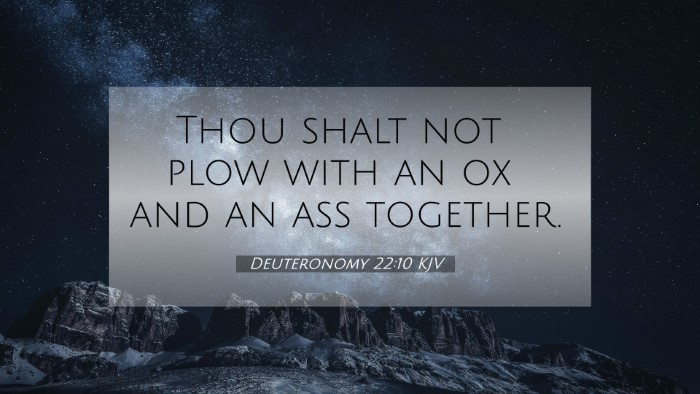Meaning and Interpretation of Deuteronomy 22:10
Verse Overview: Deuteronomy 22:10 states, "Thou shalt not plow with an ox and an ass together." This command is part of the Law given to the Israelites and carries rich implications for understanding separation and suitability in various contexts.
Commentary Insights
This verse symbolizes the principle of not mixing different kinds, which can extend beyond agricultural practices to spiritual and moral applications, reflecting God's desire for purity and order in both the natural and spiritual realm.
-
Matthew Henry's Commentary:
Henry emphasizes that this regulation serves both a practical purpose in agriculture and a deeper moral instruction. The mixing of animals could lead to inefficiency and conflict, symbolizing a broader lesson on the importance of unity and collaboration among like-minded individuals.
-
Albert Barnes' Commentary:
Barnes notes that the prohibition against plowing with an ox and an ass illustrates the larger theme of separation. Mixing two different kinds of animals is seen as a metaphor for mixing different moral or spiritual influences that can lead to confusion and strife.
-
Adam Clarke's Commentary:
Clarke elucidates that this command reflects God's concern for the order of His creation. He discusses how applying this principle could guide relationships, emphasizing that partnerships or unions (whether in business, marriage, or faith) should be made with those who share similar values and beliefs.
Thematic Connections to Other Scriptures
Deuteronomy 22:10 connects to several other Bible verses thematically, highlighting the importance of separation and the need for alignment in various aspects of life.
- 2 Corinthians 6:14: "Be ye not unequally yoked together with unbelievers." This echoes the call for suitable partnerships and the dangers of spiritual mismatch.
- Galatians 5:9: "A little leaven leaveneth the whole lump." This illustrates how mixing influences can affect the whole community.
- 1 Corinthians 15:33: "Evil communications corrupt good manners." This verse further enforces the idea of remaining separate from malign influences.
- Proverbs 13:20: "He that walketh with wise men shall be wise: but a companion of fools shall be destroyed." This highlights the importance of choosing companions who share one’s values.
- 2 Thessalonians 3:6: "Now we command you, brethren, in the name of our Lord Jesus Christ, that ye withdraw yourselves from every brother that walketh disorderly." This emphasizes the necessity to maintain righteous associations.
- Amos 3:3: "Can two walk together, except they be agreed?" This rhetorical question underscores the necessity of shared beliefs and purposes for harmony.
- James 1:8: "A double-minded man is unstable in all his ways." Reflects on the importance of consistency in belief and action.
Practical Applications and Reflections
As we reflect on Deuteronomy 22:10, several important lessons arise:
- Choosing Relationships Wisely: One should be mindful of who they associate with, whether in personal, professional, or spiritual contexts.
- Spiritual Alignment: Ensure that one’s partners share similar values and beliefs to avoid conflict and produce fruitful outcomes.
- Personal Conduct: Individuals should strive for consistency in their lives and avoid mixing influences that may lead to confusion or disharmony.
Conclusion
The command in Deuteronomy 22:10, while seemingly simple, invites deeper reflection on the nature of relationships and the importance of unity in purpose and spirit. Through cross-referencing this verse with others, we can see a broader biblical principle at work—one that encourages believers to seek harmony and purity in all aspects of life.
Tools for Further Study
If you wish to explore more about biblical cross-referencing and the connections between verses, consider utilizing resources such as:
- Bible concordance for locating themes and contexts.
- Bible cross-reference guides to discover links between different passages.
- Comprehensive Bible reference resources for in-depth analysis.
- Cross-reference Bible study methods that highlight thematic relations in scripture.



